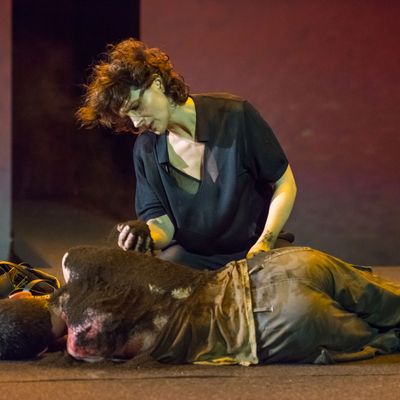
The Belgian director Ivo van Hove almost always has the term avant-garde attached to his name, but with four major New York productions this season, including two on Broadway, he probably needs a new adjective. Not that he’s completely abandoned the techniques and tics that make the style so recognizable, and thus faintly ridiculous, to regular theatergoers. Murky video, drony music, indeterminate or clashing settings are all still part of the vocabulary. His production of Sophocles’s Antigone, now at BAM, takes place both in a desert outside ancient Thebes and, downstage, on a lower level of the set, in some sort of contemporary municipal office, with a leather sofa and file cabinets. The costumes, mostly black of course, would not be unwelcome in a Soho shop window, and look particularly terrific on his star, Juliette Binoche.
But unlike some of van Hove’s earlier productions, which seemed almost parricidal in their rage to supplant the author’s artistry with his own, more recent stagings have adapted the house style in an attempt to serve the material. His trifurcated version of Ingmar Bergman’s Scenes From a Marriage at New York Theatre Workshop last year viewed that bleak work’s judgment on long-term intimacy from several devastating angles. And here, in Antigone, the familiar tropes help to reset the audience’s expectations at zero so he can bring out the particular themes he wants to address. They are not the usual Antigone themes. It is still the story of that young woman’s decision to bury her brother Polyneikes, a traitor to Thebes, even though King Kreon, her uncle, has made the act a crime punishable by death. But in van Hove’s telling, the play is less about character than justice. Whether you will appreciate that depends largely on whether you like your Greek tragedy emotional or cerebral. Apparently, you have to choose.
In any case, this production does everything it possibly can to argue rather than move — or, at best, to move through arguing. Though the text, newly translated by Anne Carson, is clean and faithful and filled with lovely bits of verbal characterization, van Hove deploys it to prevent identification with people as opposed to ideas. All of the actors except Patrick O’Kane, who plays Kreon as a bullet-headed CEO, double in roles usually assigned to others, so that when Antigone’s sister, Ismene, or her fiancé, Haimon, show up in the “chorus of Old Theban Men” — or when Antigone herself shows up as a Messenger with Bad News — you are forced to loosen your grasp on them as individuals. (The monochrome modern dress has a similar effect.) And because Kreon and Antigone, as directed here, reach peak fury quite early in the proceedings, and just stay there, the question of character is basically mooted. Binoche’s Antigone operates at such a level of hysteria that you wonder whether the desecration of her brother is really her biggest problem. (She is, after all, a daughter of Oedipus.) Her self-regarding rage justifies Kreon’s view of her as an emotional terrorist, and thus prevents you from sympathizing with her except intermittently. Not that you can sympathize with him either; the story of his intransigence and belated reversal — his hubris — feels almost like an afterthought to the story van Hove wants to tell about governance per se. Except for one beautiful moment of familiarity between them, when they briefly become just uncle and niece, they might as well be inmates in nearby cells in a psych ward.
Apparently as uninterested in psychology as he is in sympathy, van Hove instead offers Antigone as a cautionary tale about the rule of law, particularly during, or hanging over from, wartime. The logic of centralized authority is shown to be self-defeating, not only bringing down those who reject it but those who cooperate. I don’t mind that this is a far stretch from what Sophocles probably intended his characters to demonstrate; the playwright argues for flexible monarchs, not no monarchs. What bothers me about this production, though it is undeniably fascinating and very well performed — I especially admired Obi Abili as a kind of cockney guard — is the Antigone-like simplicity of its politics. In a program note, van Hove connects the play’s story to that of the passengers of Malaysia Airlines Flight 17, shot down over the Ukraine last year and left to rot in an open field for more than a week. Could anyone disagree that this was a horror? Or that the Dutch did right by eventually providing them a dignified state funeral?
We don’t get a sense of the obvious rightness of Antigone’s choice here. We don’t get horror, either. When we are shown the decaying corpse of Polyneikes, it is almost as an art object, arranged sculpturally on a platform that rises from below the stage. It is a tableau that in no way signifies dishonor, even as Binoche anoints the body and arranges flowers prettily around it; the production’s abstractness can only produce an aesthetic or intellectual response. In fact, were it not for the program note, I would never have thought of anything so graphic as Flight 17. I did think about Kim Davis, though. No less than Antigone herself, that wayward Kentucky county clerk has argued that laws are man-made whereas justice is eternal — a concept that, however true, justifies any nutjob’s vision of God’s (or the gods’) will. I’m grateful to van Hove for making such an unlikely and disturbing connection possible, but I worry, too. I’m not sure Antigone works very well as a revolutionary’s handbook, let alone an avant-gardist’s.
Antigone is at BAM’s Harvey Theater through October 4.

